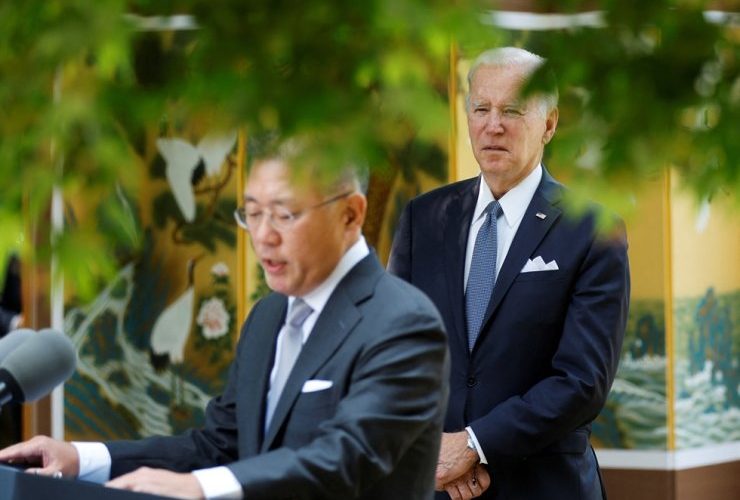| Hyundai Motor Group Chairman Euisun Chung delivers remarks along with U.S. President Joe Biden on the automaker’s decision to build a new electric vehicle and battery manufacturing facility in Savannah, Georgia, May 22. Reuters-Yonhap |
A large Korean business group has asked the US to make exceptions for Korean-made electric vehicles in its new law that says EVs made outside of North America can’t get tax breaks. The group says that if the US doesn’t do this, it will hurt Korean automakers that have invested a lot in the area.
In a letter sent Thursday (Seoul time) to U.S. President Joe Biden and five key federal departments, the Federation of Korean Industries (FKI) made the request. Seoul wants to give Washington a chance to change its mind about the tax credit provisions in the Inflation Reduction Act (IRA) that help the Korean auto industry.
FKI Chairman Huh Chang-soo said in the letter, which was also sent to the U.S. Congress and the governors of Georgia, Alabama, and Michigan, that automakers will lose out on EV tax credits for EVs made outside of North America.
“This would be a setback to all your efforts to connect our two regions and build and strengthen economic partnerships,” he said. “I hope that automakers like Hyundai and Kia will get a break from treatment that goes against the U.S.-Korea Free Trade Agreement and the World Trade Organization’s agreement on subsidies.”
The IRA, which Biden signed into law on August 16 (U.S. time), calls for more tax breaks for buying electric vehicles, but only for those made in North America. It also has rules that say electric vehicles can’t get tax credits if their batteries have parts made with minerals from China.
Korea is worried about the new law and has said that its unfairness will put its carmakers, like Hyundai Motor Co. and Kia Corp., on an unequal footing in the U.S. market, since they make their flagship electric vehicles (EVs) in domestic plants and ship them overseas.
Huh said that because of the new law, about 70 percent of the 72 EV models that were eligible for the tax credit before will now cost more for Americans to buy.
He said it would be “unfair” to car companies like Hyundai Motor that are “working hard to invest in America, create new jobs, and help the U.S. reach the goal of reducing carbon emissions set by your administration.”
Hyundai Motor has promised to spend $5.5 billion to build an electric vehicle (EV) plant and an EV battery plant in Georgia.
This week, a group of people from the Korean government went to Washington to talk with U.S. officials about the issue. In the coming weeks, Ahn Duk-geun, who is in charge of trade, and Lee Chang-yang, who is in charge of industry, will both go to Washington to talk with their counterparts about the issue.
Seoul has asked for a formal way to talk about worries about the IRA tax credits, and Washington has agreed, Deputy Trade Minister Ahn Sung-il told reporters Wednesday during the delegation’s visit. (Yonhap)


